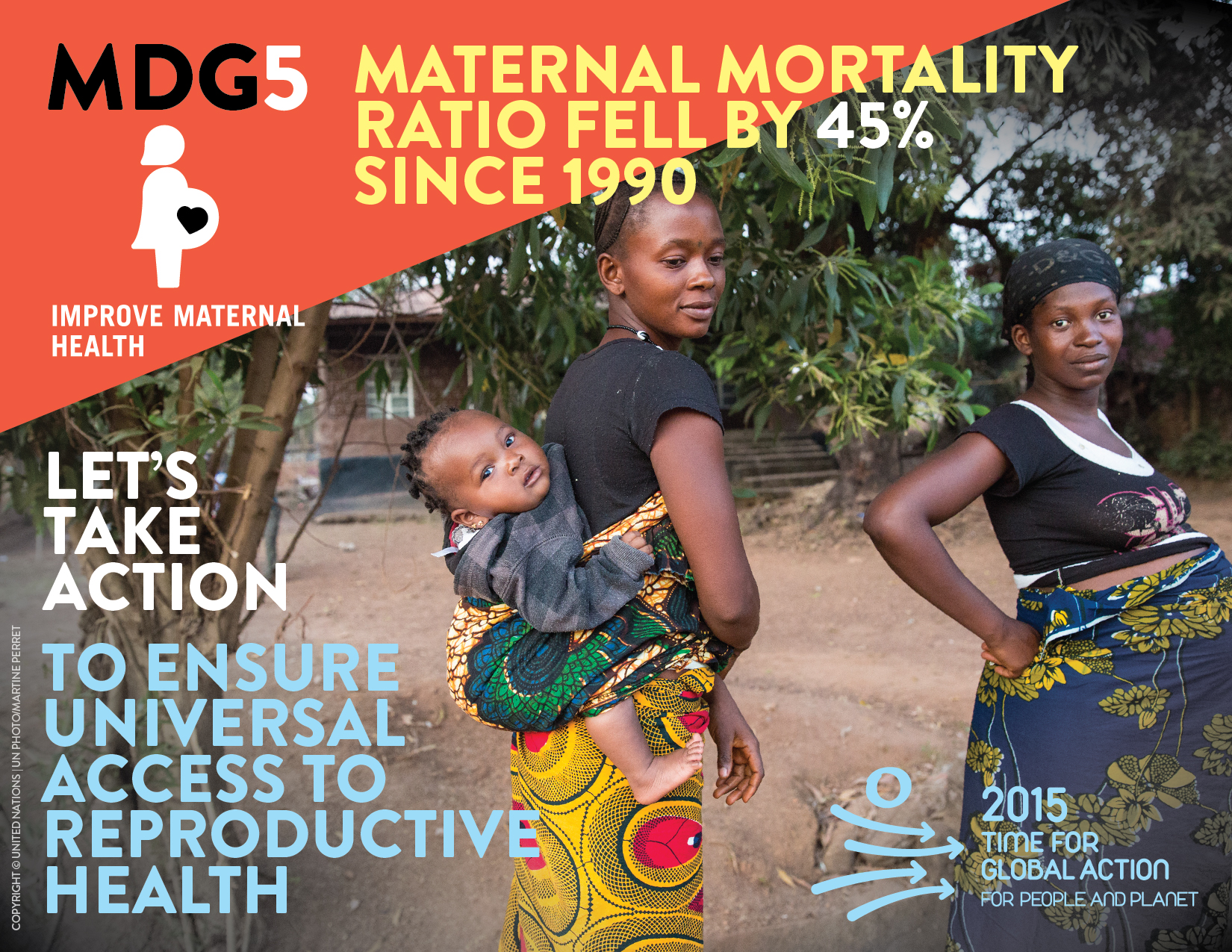How to Improve Maternal Health
To improve maternal health, access to quality healthcare and education is crucial. Taking preventative measures and addressing social determinants of health can also have a significant impact.
Maternal health is essential for the health and wellbeing of both mothers and their babies. However, worldwide, approximately 800 women die every day due to complications related to pregnancy and childbirth. Improving maternal health requires a multifaceted approach that addresses not only medical care but also social determinants of health, including poverty, gender inequality and lack of education.
Access to quality healthcare and education is crucial, and preventative measures such as family planning and early antenatal care can also have a significant impact. In this article, we will explore various ways to improve maternal health and reduce maternal mortality rates.

Credit: www.un.org
Setting The Stage: Understanding Maternal Health Challenges
The State Of Maternal Health Globally
Maternal health remains a major concern worldwide, particularly in developing countries where access to quality healthcare is limited. According to the world health organization (who), approximately 830 women die from preventable causes related to pregnancy and childbirth every day, with 99% of these deaths occurring in developing regions.
Additionally, for every woman who dies, around 20 experience significant morbidity, including chronic pain, infections, and other disabilities. These harrowing statistics indicate that there is a pressing need to prioritize global maternal health and make it a top priority for policymakers and governments worldwide.
Key points:
- Maternal health is a critical issue that affects millions of women globally.
- Developing countries bear the brunt of maternal mortality and morbidity.
- Efforts must be made to prioritize maternal health and improve access to healthcare.
Factors Contributing To Maternal Health Disparities
A plethora of factors contributes to maternal health disparities globally. These range from social, cultural, and economic to environmental and political factors. For instance, poverty, lack of education, and gender inequality often prevent women from accessing quality health care services.
Additionally, health system factors such as poor infrastructure, shortage of skilled healthcare professionals, and inadequate funding for maternal health programs also contribute to the problem. It is, therefore, crucial to address these underlying determinants to improve maternal health outcomes and reduce disparities.
Key points:
- Maternal health disparities are caused by a range of factors.
- Social and economic determinants play a crucial role in maternal health disparities.
- Improving maternal health requires addressing underlying causes, including social, political, and environmental factors.
The Importance Of Addressing Maternal Health
Investing in maternal health is vital for improving overall population health, reducing poverty, and promoting economic growth. Healthy mothers are better equipped to care for their families and contribute to their communities. Investing in maternal health also has long-term benefits, as it can help break the cycle of poverty and contribute to sustainable development.
Additionally, addressing maternal health has implications for human rights, with every woman having the right to access quality maternal health care services without discrimination. Therefore, improving maternal health is not only a moral imperative but also an economic and social one.
Key points:
- Maternal health is crucial for improving population health and reducing poverty
- Addressing maternal health disparities has long-term benefits
- Every woman has the right to quality maternal health services.
Addressing Barriers To Maternal Health
Maternal health is a critical component of global health that requires immediate attention. Unfortunately, many women around the world continue to face a variety of barriers, preventing them from receiving the care they need during pregnancy and childbirth. This makes it crucial to address these obstacles, including socio-economic, cultural and accessibility-related factors.
Overcoming Socio-Economic Barriers
Socio-economic disparities contribute significantly to maternal health outcomes. Here is how to overcome them:
- Develop community-based programs to provide health education to women and their families about common maternal health issues, including prenatal care, delivery, and postpartum care.
- Introduce policies that aim to reduce financial barriers to access maternal health care. For example, health care programs that allow women to access maternal services without incurring any out-of-pocket costs.
- Offer financial incentives to doctors who choose to work in underserved areas to create adequate access to maternal health care in low-income areas.
- Governments should work towards creating an enabling environment for women to have access to jobs and education which can lead to enhanced access to maternal health services.
Access To Quality Maternal Health Services
Another significant challenge faced by pregnant women is the lack of access to high-quality maternal health services. Here are a few steps that can be taken to improve access:
- Increase the availability of prenatal care services, delivery facilities, and emergency obstetric care services to women in underserved areas.
- Improve transportation facilities to provide quick access to hospitals or health centers for women who cannot reach medical care facilities easily, especially those residing in rural areas.
- Establish a maternal health hotline or support groups to provide women with access to information, emotional support and referral services.
- Train healthcare workers to provide compassionate care, offer patient-centered advice, and improve communication to ensure that women feel comfortable accessing care services.
Addressing Cultural Beliefs And Practices Impacting Maternal Health
Across the globe, cultural practices and beliefs around pregnancy and childbirth can impact a woman’s health. Here are some steps that need to be taken to address these cultural challenges:
- Promote awareness programs that help communities understand how traditions and cultural concepts can negatively impact maternal health outcomes.
- Work with traditional birth attendants and integrate traditional methods with modern evidence-based practices to provide a more comprehensive approach to maternal health care.
- Partner with religious leaders, elders, and community leaders to raise awareness and support on maternal health issues and use various communication channels to create targeted messages for each community.
- Encourage and promote family engagement in maternal health care by involving spouses or family members in prenatal care and childbirth education.
There is no one-size-fits-all approach to improving maternal health. By adopting a multifaceted and localized approach to address socio-economic, accessibility and cultural-related barriers, we can improve maternal health outcomes and provide every woman with the care and support they need to ensure a safe and healthy pregnancy and childbirth.
Supporting Expectant And New Mothers
The journey of motherhood is an exciting and challenging one, and it is important to ensure that mothers receive the support they need to maintain good health, both during and after pregnancy. Here are some key ways that we can support expectant and new mothers:
Ensuring Proper Prenatal Care
- Schedule regular prenatal check-ups to monitor the health of the mother and her developing baby
- Encourage a healthy and balanced diet that includes fruits, vegetables, lean proteins, and whole grains
- Advise mothers to avoid alcohol, cigarettes, and illegal drugs, which can harm the developing baby
- Ensure that mothers receive appropriate immunizations to protect themselves and their babies from preventable illnesses
Providing Breastfeeding Support And Education
- Offer resources such as lactation consultants, breastfeeding classes, and support groups to help mothers initiate and maintain breastfeeding
- Educate mothers on the benefits of breastfeeding for both the mother and her baby, as well as techniques to ensure a successful breastfeeding experience
- Provide private and comfortable spaces for mothers to breastfeed or express milk, if they choose to do so outside of their homes
Mental Health Support For Mothers
- Educate mothers and their families on the importance of mental health during and after pregnancy
- Screen for and address depression, anxiety, and other mental health disorders that can arise during and after pregnancy
- Offer support groups or counseling services for mothers who may be struggling with the emotional challenges of motherhood
By ensuring proper prenatal care, providing breastfeeding support and education, and addressing mental health concerns, we can support expectant and new mothers in maintaining good health and enjoying the journey of motherhood. Let’s ensure that all mothers have the support and resources they need to thrive!
Partnering With Healthcare Professionals And Systems
A critical step in improving maternal health is partnering with healthcare professionals and systems. Here are some ways this can be achieved:
Training And Supporting Healthcare Providers
- Train healthcare providers through workshops and seminars on maternal health risks, warning signs and complications that may arise during pregnancy, childbirth, and postnatal period.
- Provide healthcare providers with resources and materials that they can use to educate their patients about maternal health.
- Offer mentorship programs to help healthcare providers develop skills they may need to better serve their patients.
- Provide continuous professional development programs to keep healthcare providers updated with the latest evidence-based practices.
Incorporating Mental Health Services And Resources Into Healthcare Systems
- Develop and incorporate mental health services and resources into routine maternal health care.
- Increase awareness of perinatal mental disorders among healthcare providers and their patients.
- Offer psychological counseling services, support groups, and other mental health services to mothers and their partners.
- Train healthcare providers to screen patients for perinatal mental disorders and provide appropriate interventions.
Strengthening Healthcare Systems To Provide Quality Maternal Health Services
- Increase investment in healthcare systems to enhance access and quality of maternal health services.
- Improve infrastructure, equipment, and supplies to enhance the efficiency of maternal health care.
- Train healthcare providers on good clinical practices to ensure quality care services.
- Increase collaboration between healthcare providers and community health workers to ensure effective follow-up care for mothers and their newborns.
Partnering with healthcare professionals and systems is crucial in improving maternal health. By training healthcare providers, incorporating mental health services and resources, and strengthening healthcare systems, we can enhance the quality of care and reduce maternal mortality.
Advocating For Maternal Health Policies And Legislation
Importance Of Government Support For Maternal Health
It is imperative for the government to prioritize maternal health and implement policies that ensure positive outcomes for mothers and children. Here are the key points:
- Adequate funding for maternal healthcare programs is vital for lowering maternal and infant mortality rates.
- The government must prioritize initiatives that target rural areas and underserved communities where access to quality care is limited.
- Policies that support family planning, prenatal care, and maternal education can improve maternal health outcomes.
Advocacy Efforts And Success Stories
Efforts to advocate for maternal healthcare have yielded success stories globally. Here are the key points:
- Organizations such as the world health organization (who) and the united nations populations fund (unfpa) promote maternal health worldwide.
- Advocacy groups like the white ribbon alliance work relentlessly to ensure mothers are given the right treatment and care they deserve.
- Success stories from countries like bangladesh have shown that the implementation of maternal healthcare programs can lead to a significant reduction in maternal and infant mortality rates.
Progress Made And Challenges For The Future
Although progress has been made towards prioritizing maternal health, there are still significant challenges to overcome. Here are the key points:
- Maternal and infant mortality rates have reduced globally, but are still high in some countries.
- Many women still lack access to quality maternal healthcare, especially in low-income and rural areas.
- Policy implementation and healthcare infrastructure continue to pose significant challenges in the fight for better maternal health outcomes.
Let us all come together to advocate for policies that prioritize maternal healthcare and support mothers in accessing better care.
Understanding The Role Of Technology In Maternal Health
Innovative Technology In Maternal Health
Innovative technology has revolutionized maternal health care, improving accessibility, timeliness, and accuracy of health services globally. Here are some ways in which technology is transforming maternal health care:
- Mobile apps that provide education and support to women during pregnancy
- Wearable devices for monitoring maternal and fetal health
- Digital health records for efficient and secure storage and retrieval of patient information
- Automated appointment reminders to improve adherence to antenatal care appointments
- Tele-medicine and remote maternal health support
Tele-Medicine And Remote Maternal Health Support
Telemedicine has been a game-changer for maternal healthcare, particularly in rural and remote areas. Here’s how telemedicine is helping to improve maternal health outcomes:
- Remote consultations with obstetricians, midwives and other healthcare professionals to provide care and support for pregnant women and new mothers
- Real-time remote monitoring of maternal and fetal health using wearable devices to detect potential complications and initiate timely interventions
- Providing online educational resources and support groups to help women make informed decisions for their health and wellbeing
- Improving access to emergency care in remote areas through teleconsultation with specialists in urban areas
Future Prospects For Technology In Improving Maternal Health
Technology in maternal healthcare is evolving at a rapid pace, and here’s what we can expect in the future:
- Advancements in artificial intelligence and machine learning algorithms have the potential to improve the accuracy and speed of diagnosis and treatment of maternal complications
- Virtual reality is being used to provide a simulated environment for practicing childbirth procedures and managing obstetric emergencies
- Wearable devices are getting more sophisticated, with the possibility of identifying a range of maternal and fetal health indicators, including contractions and fetal movements
- Biometric technology is being leveraged to develop secure digital health records that can be accessed anytime, anywhere providing timely and efficient healthcare services.
As you can see, innovative technology can improve maternal health outcomes significantly. By providing timely and accessible health care services, remote maternal health support, and future prospects for advancements, technology is playing a pivotal role in improving maternal health globally.
Addressing Maternal Health During Emergencies And Conflicts
Unique Challenges For Maternal Health During Times Of Crises
Maternal health is faced with unique challenges during times of crises such as conflicts and emergencies, which could adversely affect the well-being of pregnant women and their babies. Here are some of the challenges:
- Disrupted healthcare systems which could lead to the unavailability of essential services such as emergency obstetric care, maternal and child health services, and prenatal care.
- The displacement of pregnant women and their families, putting them at risk for inadequate nutrition, poor living conditions, and increased exposure to violence and disease.
- The breakdown of social support structures that could further increase stress levels for pregnant women.
Response Strategies And Best Practices For Addressing Maternal Health In Emergencies
Addressing maternal health during emergencies requires swift and effective strategies for response. Here are some best practice approaches:
- Ensuring a steady supply of essential maternal health services, equipment, and medications to facilitate access to maternal healthcare even during emergency situations.
- Facilitating prenatal care for pregnant women to track their health, complications, and any preexisting medical conditions.
- Creating safe spaces where pregnant women and their children can receive healthcare services, nutrition, shelter, and protection from harm.
Advocacy For The Protection Of Maternal Health During Conflicts
Advocacy for the protection of maternal health during conflicts is crucial to guaranteeing the well-being of pregnant women and their babies. Here are some advocacy strategies:
- Raising awareness about the plight of pregnant women during conflicts through awareness campaigns and lobbying for adequate interventions for maternal health.
- Collaboration with humanitarian organizations, governments, and local communities to ensure the protection of maternal health rights during conflicts.
- Development of policies and guidelines that prioritize maternal health during conflicts and emergency situations.
By implementing the above strategies, key stakeholders can contribute to improving maternal health outcomes during conflicts and emergency situations, thereby reducing maternal mortality rates.
Maternal Health Awareness And Education
Raising Awareness About Maternal Health
Maternal health awareness is critical to tackling the issue of maternal mortality, which affects thousands of expectant mothers every year. Raising awareness can be done through several means, including:
- Conducting community outreach programs to sensitize people about maternal health
- Implementing mass media campaigns, including social media, to educate the public about maternal health and childbirth.
- Encouraging policymakers to make maternal health a priority, which will help increase public awareness and create political will for change.
Importance Of Comprehensive Maternal Health Education
Comprehensive maternal health education plays a vital role in improving maternal health outcomes. It allows expectant mothers to make informed decisions, increasing their chances of good health and reducing maternal mortality. Moreover, comprehensive maternal health education should include:
- Access to family planning services, antenatal care and skilled birth attendants.
- Education on the importance of proper nutrition and safe and healthy lifestyle choices for expectant mothers.
- Education on emergency obstetric care and postpartum care for both the mother and the newborn.
Engaging Communities To Address Maternal Health Disparities
The issue of maternal health disparity can be adequately addressed by engaging communities to bridge the gap. Several strategies can help achieve this:
- Providing training to community health workers and traditional birth attendants. This will equip them with the knowledge and skills to address the issue of maternal health-related problems in their communities.
- Encouraging males in the community to be advocates of maternal health. This can be achieved by involving male community leaders in the maternal health discussion and educating them on the importance of maternal health.
- Providing cultural sensitivity training to health care providers, which will ensure that maternal health care is provided with an understanding of cultural practices and beliefs of various communities.
By raising maternal health awareness and education, and engaging communities to bridge maternal health disparities, we can create a better world for expectant mothers and their newborns.
Investing In Maternal Health Research
Maternal health is a significant concern as it not only affects the mother but also her child, family, and community. With an increasing number of maternal deaths globally, investing in maternal health research has become crucial for improving the quality of maternal healthcare services.
In this section, we will discuss the research priorities for improving maternal health, current research efforts and breakthroughs, and the importance of investing in maternal health research.
Research Priorities For Improving Maternal Health
There are several research priorities that require attention to improve maternal health. Some of the key areas of research include:
- Addressing the root causes of poor maternal health, such as poverty, lack of education, social inequality, and inadequate access to healthcare facilities.
- Identifying effective interventions for preventing and managing maternal complications, such as pre-eclampsia, gestational diabetes, and postpartum hemorrhage.
- Developing innovative technology and tools for improving maternal health outcomes, including telemedicine, mobile health, and electronic health records.
- Evaluating the impact of different healthcare models and policies on maternal health, such as community-based care, midwifery-led models, and health insurance.
Current Research Efforts And Breakthroughs
Significant progress has been made in maternal health research in recent years, and some of the breakthroughs include:
- Advancements in understanding the complex physiological changes that occur during pregnancy and childbirth.
- Development of new diagnostic tools and screening tests for maternal complications.
- Increased focus on maternal mental health and its impact on maternal and child outcomes.
- The emergence of new interventions such as skill-based training programs for healthcare workers, induction of labor in obese women, and use of antenatal corticosteroids for fetal lung maturation.
Importance Of Investing In Maternal Health Research
Investing in maternal health research has several benefits, including:
- Improving the quality of maternal healthcare services, which can result in reduced maternal morbidity and mortality rates.
- Enhancing health outcomes for mothers and their children, leading to healthier families and communities.
- Generating new knowledge and evidence-based practices that can inform policies and programs aimed at improving maternal health.
- Contributing to global efforts to achieve sustainable development goal 3, which aims to ensure healthy lives and promote well-being for all at all ages.
Investing in maternal health research is critical for addressing the global maternal health crisis. The research priorities, current efforts, and breakthroughs in maternal health research provide a direction for improving maternal health outcomes. Continued investment in further research is necessary for meeting the challenges of maternal health and ensuring a brighter future for mothers and their children.
Frequently Asked Questions For How To Improve Maternal Health
How Can Maternal Health Be Improved During Pregnancy?
Maternal health during pregnancy can be improved by regular prenatal checkups, healthy diets, and staying active.
What Are The Major Causes Of Maternal Mortality?
The major causes of maternal mortality include severe bleeding, infections, high blood pressure, unsafe abortion, and obstructed labor.
How Does Access To Healthcare Impact Maternal Health?
Access to healthcare services such as prenatal checkups, emergency obstetric care, and family planning can significantly improve maternal health outcomes.
What Is The Role Of Family Planning In Maternal Health?
Family planning enables women to space their pregnancies, which reduces the risk of maternal death and complications during childbirth.
What Can Be Done To Reduce Maternal Mortality Rates?
To reduce maternal mortality rates, we need to invest in improving access to quality healthcare services, education and empowerment of women, and addressing social and cultural norms that hinder maternal health.
Conclusion
Maternal health is a crucial issue that needs immediate attention if we want to improve the quality of life for women. The journey towards better maternal health is a long and challenging one, but it can be easily facilitated by taking small steps in the right direction.
By following some of the tips that we have discussed in this article, such as seeking prenatal care, practicing good hygiene, and having access to important healthcare facilities, we can reduce the number of deaths resulting from pregnancy and childbirth.
Ultimately, it is entirely up to us to ensure that the journey toward better maternal health is one that we undertake with diligence and determination. By prioritizing maternal health, we ensure a brighter and healthier future for generations to come.







2 thoughts on “How to Improve Maternal Health”
Comments are closed.